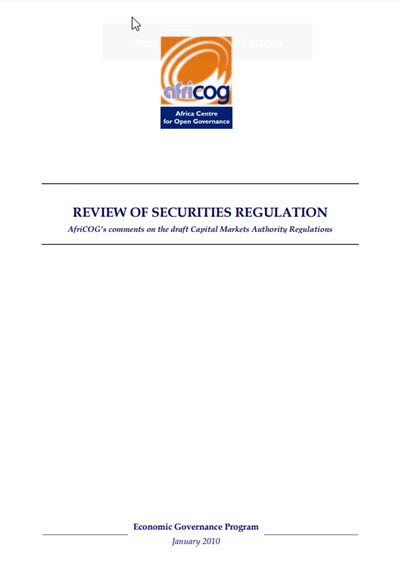The ability of an empowered CMA to carry out its supervisory and enforcement mandate effectively fosters public confidence in the securities industry. An effective regulator acts in the interest of the public and has processes that are open and accountable to the public and the regulated entities.
In 2008-2009, AfriCOG responded to a call for stakeholder input into the new proposed regulations developed by the CMA under the financial and legal sector technical assistance project. AfriCOG’s response involved a study of the financial markets, with the capital markets as one of the sectors reviewed.
The general objective of AfriCOG’s intervention was to contribute to the protection of the public interest and participation through improved institutional governance and accountability of all key players in the financial markets.
Some of the key challenges identified in AfriCOG’s study of the capital markets
sector include:
1. Low transparency and overall poor governance of stockbrokerage firms
leading to their collapse and subsequent loss of investor funds.
2. Incidences of market manipulation/insider trading as evidenced by court proceedings.
3. Lack of adequate disclosure e.g. publishing of accounts and transparency in operations of regulated entities.
4. The Nairobi Stock Exchange (NSE) has undergone a period of depressed stocks, also known as a ‘bear market’, with many stocks trading at below listing price.
5. Unauthorised trading of client shares by stock brokers.
6. Latent conflict of interest/corporate governance concerns around ownership of regulated entities.
7. Lack of inter-agency cooperation and several overlaps, especially in
the financial sector, have led to double licensing and uncertainties in
the market.
There is a positive role and economic rationale for regulation in financial markets, more so where there are market imperfections and failures in financial sector players, for example, as seen in the collapse of Francis Thuo and Nyaga stockbrokers1. The creation of a properly regulated market does not only foster the growth of markets but creates an environment where competition and innovation can flourish.
Public interest theory proposes that the goal of regulation should be to maintain and protect the public good. Regulation of industry and organisation should protect and benefit all of society
In reviewing the CMA regulations, AfriCOG attempted to gauge their effectiveness in addressing the challenges enumerated above. As a civil society organisation with governance as its area of focus, a number of concerns informed our comments and proposals:
- The need for transparency in the securities sector
- The need for accountability of the regulator
- The need for accountability of the regulatees
- Other public interest concerns
